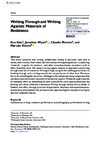Writing <i>With:</i> Collaborative Writing as Hope and Resistance
| dc.contributor.author | Diversi, M | |
| dc.contributor.author | Gale, K | |
| dc.contributor.author | Moreira, C | |
| dc.contributor.author | Wyatt, J | |
| dc.date.accessioned | 2022-11-08T16:55:12Z | |
| dc.date.available | 2022-11-08T16:55:12Z | |
| dc.date.issued | 2021-08 | |
| dc.identifier.issn | 1940-8447 | |
| dc.identifier.issn | 1940-8455 | |
| dc.identifier.uri | http://hdl.handle.net/10026.1/19940 | |
| dc.description.abstract |
<jats:p> Collaboration in scholarship holds the peculiar position of being expected, encouraged, and, in the process, somewhat taken-for-granted as monolithic academic practice. Collaboration is important for the cultivation of a rich ecosystem of ideas, thoughts, methods, theories, and experimentation. It seems safe to assume that most scholars would agree with the need and the possibilities of collaboration. Yet, collaboration in scholarship is often understood in reductionist and pragmatic ways: While ideas and thoughts flow in certain stages of the collaboration, labor is often divided among collaborators, authorship is ranked and quantified, and subjective lived experiences are most ignored or codified in rigid fashion. In this article, we attempt to further explore how collaboration can also be an act of leaning on each other in order to make sense of thinking and narrating hope and resistance in times of neo-nationalism and authoritarianism. We each live in different parts of the planet, yet we share a common hope. Here, we come together to think, feel, commune, and write with each other in hope to find ways beyond individual positions and in search of collaborations that allow us to imagine possibilities of resistance and paths toward a kinder and more just future. </jats:p> | |
| dc.format.extent | 302-312 | |
| dc.language | en | |
| dc.language.iso | en | |
| dc.publisher | SAGE Publications | |
| dc.title | Writing <i>With:</i> Collaborative Writing as Hope and Resistance | |
| dc.type | journal-article | |
| plymouth.issue | 2 | |
| plymouth.volume | 14 | |
| plymouth.publication-status | Published | |
| plymouth.journal | International Review of Qualitative Research | |
| dc.identifier.doi | 10.1177/1940844720978761 | |
| plymouth.organisational-group | /Plymouth | |
| plymouth.organisational-group | /Plymouth/Faculty of Arts, Humanities and Business | |
| plymouth.organisational-group | /Plymouth/Faculty of Arts, Humanities and Business/Plymouth Institute of Education | |
| plymouth.organisational-group | /Plymouth/REF 2021 Researchers by UoA | |
| plymouth.organisational-group | /Plymouth/REF 2021 Researchers by UoA/UoA23 Education | |
| plymouth.organisational-group | /Plymouth/Research Groups | |
| plymouth.organisational-group | /Plymouth/Research Groups/Institute of Health and Community | |
| plymouth.organisational-group | /Plymouth/Users by role | |
| plymouth.organisational-group | /Plymouth/Users by role/Academics | |
| dc.identifier.eissn | 1940-8455 | |
| dc.rights.embargoperiod | Not known | |
| rioxxterms.versionofrecord | 10.1177/1940844720978761 | |
| rioxxterms.licenseref.uri | http://www.rioxx.net/licenses/all-rights-reserved | |
| rioxxterms.type | Journal Article/Review |


